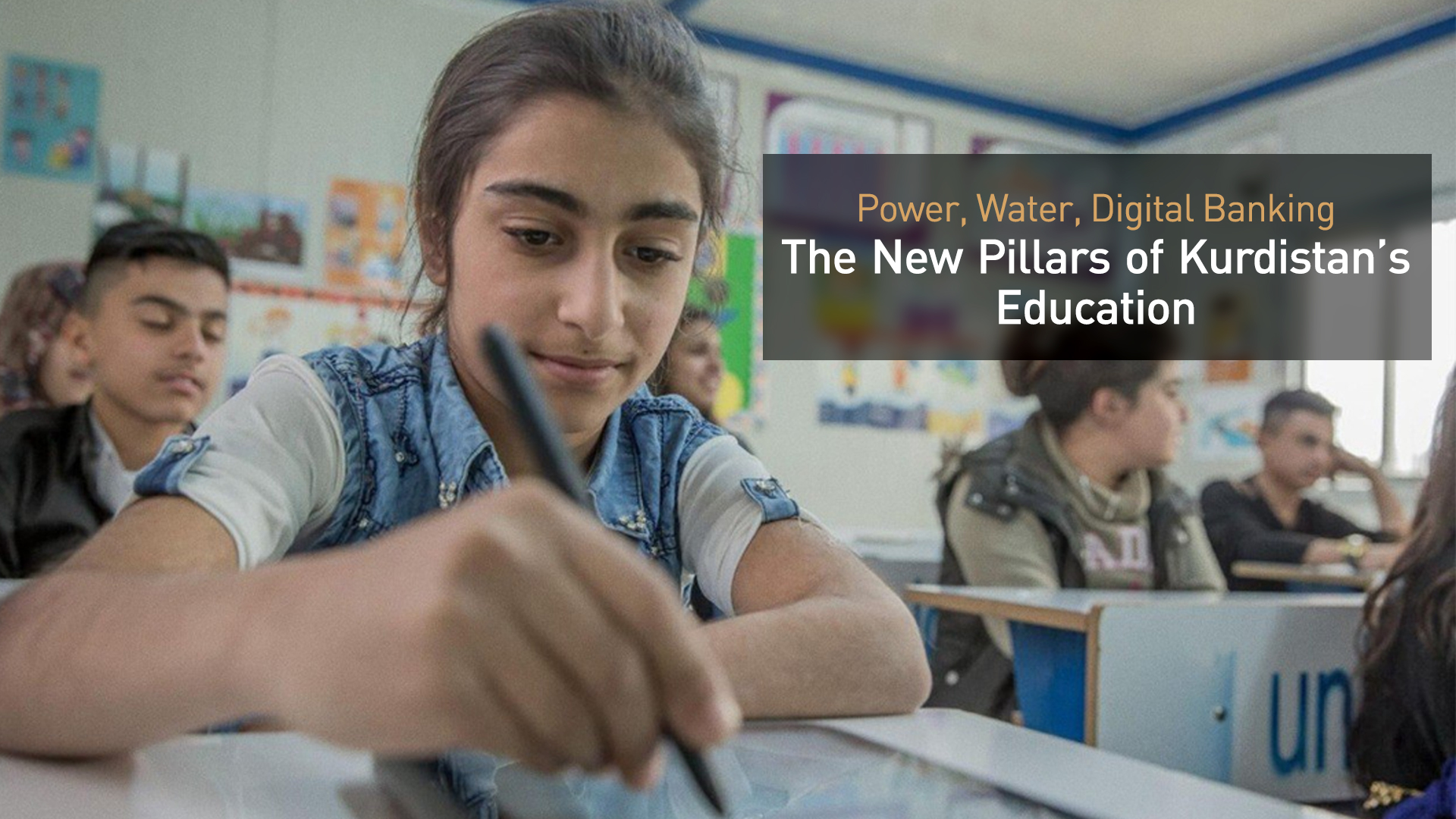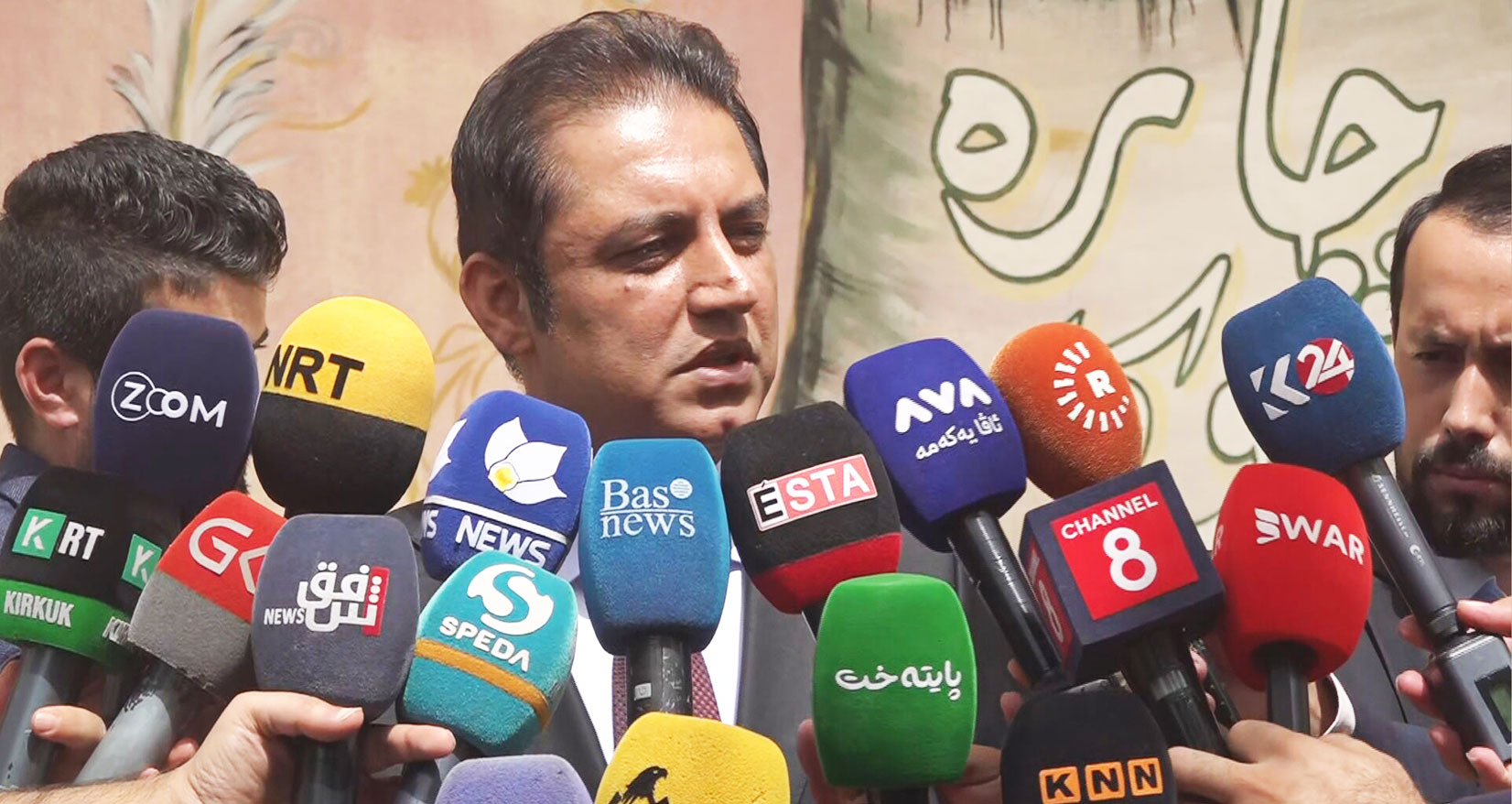KRG's Strategic Trinity: How Power, Water, and Digital Banking Projects Are Revolutionizing Kurdistan's Education Sector
KRG's Runaki, Water, and MyAccount projects are revolutionizing education by providing stable power for tech, clean water for health, and digital salaries for teachers, part of a broader push for modernization and improved public services across the Kurdistan Region.

ERBIL (Kurdistan24) – In a powerful testament to the far-reaching impact of strategic governance, three cornerstone projects championed by the Kurdistan Regional Government (KRG) under Prime Minister Masrour Barzani are fundamentally reshaping the educational landscape, directly enhancing the quality of learning and modernizing school environments across the region. The Runaki project for 24-hour electricity, the Erbil Emergency Rapid Water Supply project, and the MyAccount digital salary initiative are creating a synergistic effect, removing long-standing obstacles and paving the way for a new era of technological integration, improved student well-being, and administrative efficiency within Kurdistan's schools.
Speaking at a press conference on Sunday, Alan Hama Saeed, the KRG Minister of Education, announced that these three major projects have had the most significant and profound impact on the education sector. His remarks highlighted a direct correlation between the government's investment in foundational infrastructure and the tangible improvements being witnessed in classrooms, demonstrating a cohesive vision where public service enhancement directly fuels human capital development.
The initiatives are not merely about delivering utilities or services; they represent a fundamental investment in the future of Kurdistan's youth by creating an environment where modern, effective education can finally flourish unimpeded.
A New Dawn for Learning: The Transformative Power of Uninterrupted Electricity
At the heart of this educational revolution is the Runaki project, an ambitious initiative that is steadily delivering on its promise of 24-hour electricity.
Minister Hama Saeed detailed how this single development has unlocked unprecedented potential within schools. "The Runaki project, in addition to benefiting approximately 2,700,000 citizens, has its greatest impact on the education sector and the quality of learning," he stated. He provided concrete examples of this transformation, explaining that the chronic lack of reliable power had previously rendered modern teaching tools unusable.
"For example, if we wanted to install a smart board in a school, which we couldn't do before because of electricity, we can now do that because there is 24-hour electricity," the Minister explained. "Therefore, thanks to the Runaki project, teachers can now use data shows and smart boards, which they previously could not."
This shift marks a pivotal moment, enabling educators to move beyond traditional methods and embrace interactive, digital-first pedagogy that is essential for preparing students for the 21st-century economy.
The impact is also felt in the most basic aspects of the school day. The Minister of Education painted a vivid picture of the challenges faced by schools operating on a two-shift system, particularly during the dimly lit winter months.
"Often, schools that had two shifts would not hold their fifth and sixth classes at the beginning of the winter season, especially those with old designs where the room would get so dark that the teacher had to turn on their mobile phone's light," he recalled. This stark image of educators resorting to their personal devices to illuminate a lesson is now being relegated to the past.
"But now, with the completion of the Runaki project, educational centers are the biggest beneficiaries," he affirmed. The government's commitment to energy in education extends beyond the grid, as the minister also announced that 120 schools have already been converted to solar power, with an additional five billion dinars approved for further expansion, though he noted a current challenge in spending the liquidity.

Beyond the Classroom: Ensuring Health, Dignity, and Efficiency
The benefits of the KRG's strategic initiatives extend beyond the classroom's electrical outlets, touching upon the fundamental well-being of students and the professional dignity of educators. The Minister of Education highlighted the critical importance of the Erbil fast water delivery project, which addresses a long-standing issue of water scarcity that has particularly affected schools.
"In Erbil province, students' access to clean water was limited, but with the implementation and completion of the Erbil fast water delivery project, schools will be in a much better situation this year," he said. This ensures a healthier and more hygienic learning environment, a prerequisite for effective education.
Simultaneously, the "My Account" project is revolutionizing the administrative side of the education system, replacing an archaic and burdensome salary distribution process with a modern, secure digital framework. Minister Hama Saeed described the previous system as one fraught with risk and inefficiency.
"Previously, a school principal and two other people would have to visit the bank and bring the salary money in a sack. If the money was short, it would create problems for them," he explained. The MyAccount initiative eliminates this precarious practice, empowering educators with financial autonomy and freeing school administrators to focus on their primary role: educational leadership.
"But now, the teacher has their own account and receives the salary themselves," he noted, framing it as one of the largest and most impactful projects.
In his concluding remarks, the minister placed these service-oriented achievements within the broader context of the KRG's governance, confirming that the government is meeting its obligations to secure the financial stability of the region. He announced that during the last Council of Ministers meeting, the oil issue with the federal government was finalized, with all ministers voting in favor of the agreement.
"According to the agreement, 50,000 barrels will be for domestic use, and whatever else is produced will be given to the SOMO company," he stated, adding that the KRG "has fulfilled all its obligations in order to secure the salaries for its employees and salary-recipients."
Runaki: The Engine of a Broader Societal Transformation
The Runaki project's transformative effect on schools is a reflection of its profound and multifaceted impact across the entire Kurdistan Region, a success story previously documented in a series of reports by Kurdistan24. The initiative has delivered a cleaner environment, better public health outcomes, and significant economic relief to citizens.
Environmentally, the project has been a landmark success.
🌤 Erbil’s Skies Clear 🌿
— Kurdistan 24 English (@K24English) August 13, 2025
KRG’s Runaki Project shut down thousands of diesel generators, cutting pollutants by 50% and boosting visibility to 10 km, benefiting 2.75M citizens.
📊 Data confirmed by the Kurdistan Region’s Environment Board.
📸 The photo shows Erbil’s skyline… pic.twitter.com/8IkPajgnS2
By enabling the shutdown of over 2,500 neighborhood diesel generators region-wide—including 1,734 in Erbil alone—it has drastically improved air quality. A Kurdistan24 report from August 11, 2025, confirmed that levels of hazardous pollutants like PM2.5 and PM10 in Erbil have fallen to less than half their previous levels, a change that has increased atmospheric visibility from six kilometers to a much clearer eight to ten kilometers.
This has been corroborated by residents like Mohammed Burhan, who told Kurdistan24, "Erbil's environment has become noticeably cleaner; the smoke and dust of the past are gone." Sanan Abdullah, spokesperson for the Environment Board, confirmed to Kurdistan24 in July that the project had cut harmful gas emissions by 30% in a "record time."
This environmental cleanup has direct public health benefits. Dr. Hardi Jawad, director of Nanakali Hospital for Oncology, told Kurdistan24 that by eliminating the carcinogenic smoke from thousands of generators, the Runaki project "will have a very positive impact on reducing the number of cancer patients in the future." This long-term health dividend underscores the project's strategic depth.
Economically, the project has provided immense relief. Aziz Ahmad, Deputy Chief of Staff to the Prime Minister, noted that 80% of households now pay less for electricity than they did for combined national power and private generator fees. This was echoed by citizens like Waleed Ibrahim, who told Kurdistan24 his total bill is now less than half of what he used to pay for the generator alone.
MyAccount and Water Security: Pillars of a Modern State
The MyAccount and Erbil Water projects are similarly well-documented pillars of the KRG's modernization agenda. The MyAccount initiative, announced by Prime Minister Barzani in February 2023, is a key component of the ninth cabinet's strategy to enhance financial inclusion and transparency. As reported by Kurdistan24, the program has already registered over 810,000 public sector employees, with more than 400,000 actively receiving their salaries through a network of over 400 ATMs. The project adheres to strict international banking standards, excluding sanctioned institutions and requiring participating banks to invest heavily in retail infrastructure and customer service, ensuring its long-term viability and security.
The Erbil Emergency Water Project is an equally ambitious undertaking designed to secure the capital's water supply for decades. As Kurdistan24 reported, Prime Minister Barzani inaugurated the first phase of the nearly $480 million project in July 2025. Upon full completion, it is expected to resolve Erbil's water shortage problem by 100% and protect the city from scarcity for the next 30 years.
Officials from the Erbil Water Directorate have consistently affirmed that the city's drinking water meets the highest World Health Organization standards, a quality baseline that this massive infrastructure project will now guarantee in terms of quantity and reach for a growing population, including its vital educational institutions.
Together, these three initiatives form a cohesive and powerful strategy. They demonstrate a government moving beyond temporary fixes to build resilient, modern systems that improve daily life, safeguard the environment, and, most critically, provide the foundational support necessary for the education sector to thrive, ensuring a brighter and more prosperous future for the next generation of Kurdistan.